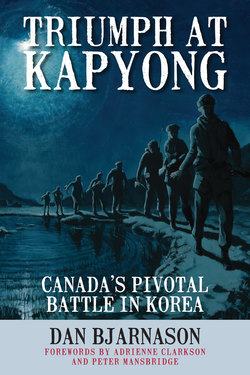Читать книгу Triumph at Kapyong - Dan Bjarnason - Страница 6
На сайте Литреса книга снята с продажи.
ОглавлениеForeword
by Peter Mansbridge
There’s a small plastic container on a shelf in my office at the CBC in Toronto. Most people don’t even notice it. I do. Almost every day.
Dan Bjarnason brought it to me in April of 1992, just after he’d arrived home from an overseas assignment. He had travelled across the ocean to report on half a dozen First World War veterans who had fought at one of the most important battles in Canadian military history — the battle of Vimy Ridge. They’d returned to the same spot, seventy-five years on, to honour the 3,598 Canadians who died on that ridge, in a battle that helped define us as a nation. Vimy Ridge is hallowed ground, and the stunning Walter Allward monument that looms over the area is testament to the first time Canadians had fought under Canadian command.
So what’s in the container? And why do I cherish it to this day? Dan knew that as an amateur military history buff myself, I had envied his assignment. I’d never been to Vimy Ridge and desperately wished I had. So Dan did the next best thing — he brought Vimy Ridge to me. He scooped up a small amount of Vimy soil, placed it inside a 35mm camera film capsule, brought it back across the ocean, and placed it on my desk. Every once and a while I do more than just look at that old capsule — I open it and touch the particles inside. Touching history.
Over the years I’ve added a few other little containers to the collection Dan started for me: sand from Juno Beach in Normandy, gravel from Apeldoorn in the Netherlands, a stone from Hong Kong. All encourage me, again, to touch history.
Which brings me to this book. It’s written by my friend and colleague of almost forty years, that same Dan Bjarnason. The conflict in Korea in the early 1950s and Canada’s role in it has been called the “Forgotten War,” and for the most part that description is correct. So few Canadians know what happened, why it happened, and how our own soldiers fought and died there.
That near amnesia over Korea is surprising given the enormous strategic importance and dreadful scale of the conflict in which, for three years, communist forces of North Korea and China slugged it out with U.S. and U.N. contingents in what famed American military historian S.L.A. Marshall called “The century’s nastiest little war.”
For all frontline troops in the war, including Canadian, U.S., British, and various U.N. troops, as well as those on the communist side, the term “little” would not have come easily to mind. It was an enormous bloodbath involving Chinese mass human-wave attacks and ferocious artillery duels that saw a pace of battle deaths that far outstripped even the subsequent Vietnam War.
It was in this landscape of mountain trenches, dugouts, and steel defences in Korea that Canadian troops made their mark through repelling Chinese troop attacks and in repeated patrolling into no man’s land. They fought largely within a famously steady Commonwealth Division made up of British, Australian, Canadian, and New Zealand troops. Canadian “volunteers” sailed off to Korea without illusions about war. A great many were veterans of the Second World War, and their ranks contained, according to historian Desmond Morton, “plenty of rough diamonds with battle experience.”
All their toughness would be required for a war remembered by veterans not only for bitter fighting, but for a relentlessly harsh climate, where one baked in summer and froze in winter, and where the terrain of one mountain range flowed into another, seemingly designed to make war impossible for armour, and hellish on infantry.
It was a lonely conflict. Troops felt cut off from home, and served without the kind of intense and united popular support that had bolstered Second World War troops. And over this very “hot” war there hung a curtain of Cold War terror almost unimaginable today. The U.S. talked openly of the possibility of using nuclear weapons to end fighting, while China hinted as broadly of its ability to flood Korea with up to a million fresh troops.
The war resulted in a partial victory for the West, as the aggression was stopped and thereafter contained. But there was little celebrating once the fighting was over, and returning troops never received the debt of gratitude their countries owed them.
Instead, the very nightmarish quality of the Korean War caused western societies to push it well into the background of thought, where it remains to this day.
No one, and certainly not Canadians, should forget the sacrifices of the past. For me those little capsules containing the soil where some of our most famous military moments took place help do that. For all of us, this book can now do the same for a part of our proud history so many of us know virtually nothing about. That is so wrong. Those who never came home from a fight we asked them to conduct on our behalf deserve better from their country.
Read on, and touch history. Our history.
Peter Mansbridge
